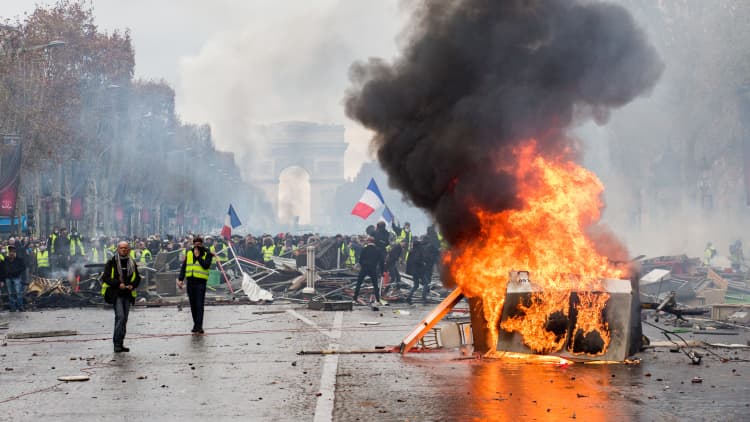Italy was firmly in the spotlight — and on Europe's naughty step — until recent weeks for its budget-busting spending plans but civil unrest in France is now dominating Europe's attention.
Riots, looting and vandalism plagued Paris and other cities at the weekend as France witnessed its fourth consecutive weekend of anti-government demonstrations that have made President Macron's government look vulnerable.
The unrest, coupled with political uncertainty in Europe – seen in Germany as Angela Merkel winds down her leadership and wider Europe ahead of European parliamentary elections in May 2019 – mean that Italy's controversial 2019 budget should no longer be the main focus of attention in the region.
"Italy's risks to the market, and even Europe, seems quite limited in the sense that you have a lot of safeguards in place and we've already seen a lot of risk-off in Italy," Christian Mueller-Glissmann, Managing Director, Portfolio Strategy at Goldman Sachs, told CNBC on Monday.

"Next year, the focus might shift to broader Europe for other reasons," he told CNBC's Squawk Box Europe. "We have European Parliament elections, we have relative instability in Germany, and France these days, and I think that this could start to be a bigger story than Italy," he said.
The bigger story
Protests in France started because of opposition to planned fuel tax increases by the French government as part of environmental policy but have since evolved into wider anti-establishment protests against French President Emmanuel Macron.
The president is due to make a statement Monday evening in which he could announce further concessions on economic reforms that protesters say neglect their needs.
With more than a whiff of schadenfreude, Italy certainly seems to be enjoying not being the center of Europe's attention. Italy's Deputy Prime Minister Matteo Salvini — who has been criticized by Macron in the past, particularly for his right-wing views — said on Saturday that Macron is to blame for the protests.
"History will probably show that if (Macron) had focused more on the French and less on Salvini and Italy, he would have a few less problems today," Salvini told Rai 3 TV on Saturday, Reuters reported, as riots erupted in Paris for a fourth consecutive weekend.
"Macron reduced taxes for the very well-off and increased them for those less well off," he added, saying the Italian government had no intention of following this example, Reuters said.
Spending right
Relations between Italy and France are strained with migration a key point of tension between Salvini and Macron.
Both politicians stand for opposite ends of the European political spectrum; as leader of the anti-immigration Lega party, Salvini is firmly on the right and he advocates a smaller, less powerful European Union, while Macron is seen as a figurehead for the European project and has called for more integration and centralization.
Salvini's fellow Deputy Prime Minister Luigi Di Maio, who leads the anti-establishment Five Star Movement (M5S), has said in the past that he had "no doubt" that the leaders of France and Germany wanted Italy's euroskeptic government to fall.
Lega and M5S have produced controversial 2019 spending plans which have seen Italy clash with the European Commission. The spending plans envisage the introduction of a basic income for the poor, a lower retirement age and a proposed flat tax rate.
Brussels has rejected the budget, however, saying that it goes against EU rules that states should work towards lowering their budget deficits and debt piles (Italy has the second highest debt pile in the euro zone of 133 percent of GDP). The commission has said Italy needs to amend its spending plans if it wants to avoid sanctions, including a possible fine. We have yet to see what amendments Italy will announce.
Markets have been remarkably sanguine regarding Italy's clash with Brussels, however, and expect a solution to be found. Goldman's Mueller-Glissmann told CNBC that the effect of Italy's collision with the commission had so far been contained.
"Italy is in a deep bear market, we've seen a lot of widening of credit and yet nevertheless we've not seen a lot of spill-over, I've think it would need to get to the next level with more downgrades and more significant market stress from Italy spilling over to banks and other parts of Europe," he said. "My sense is that Italy will potentially dominate headlines into the new year, but won't be such of a big problem in 2019."


